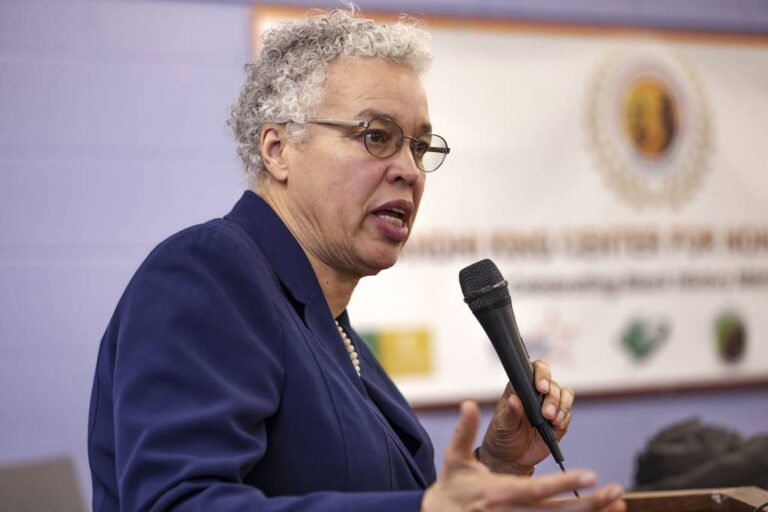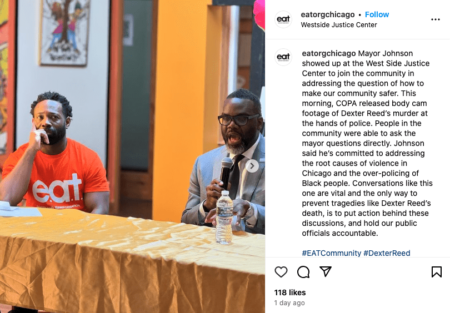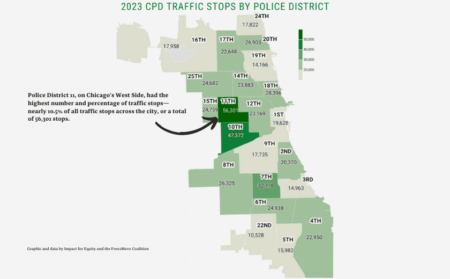A Cook County initiative to address the effects of medical debt has so far erased more than $25 million in past-due bills and is expected to wipe out about $55 million more in the coming weeks for 73,000 county residents total, officials told the Tribune.
The first round of debt-buying has spent down just $800,000 of the county’s allotted $12 million for the federal funded program. Officials hope to erase $1 billion in debt before its expiration.
In July, the Cook County Board approved President Toni Preckwinkle’s proposal to spend $12 million of the county’s $1 billion allotted American Rescue Plan funds for the program through the end of 2024. The COVID-19 relief ARPA dollars must be spent by the end of 2026.
The goal is to purchase and retire the medical debt of county residents unable to cover their outstanding medical bills because of financial hardship. Eligible recipients have incomes of up to 400% of federal poverty guidelines, about $55,000 for an individual, or have medical debt that is 5% or more of their estimated household annual income.
The county contracted with the nonprofit RIP Medical Debt to manage the program. Working with hospitals and physicians’ practices, the nonprofit buys qualified medical debt — often for pennies on the dollar — directly from hospitals and physicians groups. Rather than attempt to collect on it, the group forgives the debt and works to have it erased from credit reports. It contacts beneficiaries directly with a letter giving notice that their medical debt has been wiped out.
“Medical debt is a real problem for low-income families, particularly in communities of color. It’s not just a debt burden and a complication and a negative impact on their credit rating, but it’s also likely that people don’t pursue other medical care given that they already have this medical debt burden,” Preckwinkle said. “So it’s a fiscal challenge, one of the principal reasons for bankruptcy in this country. It negatively impacts people’s credit scores, and it’s a health care challenge.”
Though officials hoped that those letters would land over the 2022 holiday season, the first 45,000 notices didn’t begin to hit mailboxes until February.
“Look, I think we have the biggest program in the country, and we were surely first out of the gates. So it takes a little while to get these things up and going,” Preckwinkle told the Tribune in an interview Monday. “The hardest participant to get is the first, and once institutions are involved and can spread the knowledge of what a good idea this is, and that it’s a more compassionate way of dealing with medical debts than sending it to collection agencies, we’ll have more institutions get on board.”
RIP Medical Debt President and CEO Allison Sesso said, “Hospitals are bureaucracies, so it does take some time to weed our way through those bureaucracies. And so it’s really hard to predict how long it will take to get approvals” from legal, financial and board officials.
The first takers, according to Sesso, are Vituity, a national physician-based practice that serves hospitals; Chicago-based Mount Sinai, a safety net hospital; and AdventHealth.
Sesso said average debts cleared for physician care in the first round ranged from $500 to $1,000. For hospitals, the average debt was closer to $2,000.
Asked whether the county could spend the $12 million allotted in time, Sesso said, “Absolutely. … It takes a little while to get the hospitals warmed up, but once you get revving, and we have, you get there pretty quickly. I do feel like it’s sort of a domino effect. When the first falls, the others sort of follow.”
Cook County Health, which runs the flagship Provident and Stroger hospitals and a series of clinics, and does send past-due debt to collections, is not eligible for the county’s program due to federal restrictions. But RIP has previously said privately fundraised dollars will support debt relief efforts there. Those have not yet begun, Sesso said, because “we’re really focused on spending down the ARPA dollars because there is a time limit.”
Since Cook County rolled out its programs, Toledo, Ohio, and New Orleans have also contracted with RIP on similar programs.
“There’s probably 30 other counties, cities and states that have proposed this and are on their way to engage in this,” Sesso said. Cook County is “certainly a trendsetter,” and its announcement “has meant a lot of attention to what we’re doing across the country, which I think is really valuable.”
Preckwinkle acknowledged that debt erasure is only a Band-Aid to address larger issues with the cost and provision of medical care. “It’s no secret, I’ve said it before, I believe in universal health care coverage. We’re not there yet.”







